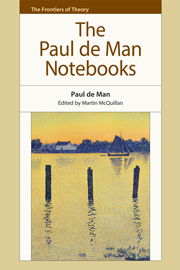Book contents
- Frontmatter
- Contents
- Series Editor's Preface
- Acknowledgements
- Dedication
- Introduction: ‘The Unimaginable Touch of Time’: The Public and Private in the Notebooks of Paul de Man
- PART I Texts
- 1 The Drawings of Paul Valéry (1948)
- 2 Jacques Villon (1952)
- 3 Graduate Essay on Keats (1954)
- 4 Postdoctoral Essay on Symbolism (c. 1960)
- 5 Introduction to Madame Bovary (1965)
- 6 Introduction to The Portable Rousseau (1973)
- 7 On Reading Rousseau (1977)
- 8 Translator's Introduction to “Rousseau and English Romanticism” (1978)
- 9 Rousseau and English Romanticism (1978)
- 10 Introduction to Studies in Romanticism (1979)
- 11 Hommage à Georges Poulet (1982)
- 12 A Letter from Paul de Man (1982)
- 13 Reply to Raymond Geuss (1983)
- 14 Interview with Robert Moynihan (1984)
- PART II Translations
- PART III Teaching
- PART IV Research
- Appendix. The Notebooks of Paul de Man 1963–83
- Bibliography
- Index of Names
7 - On Reading Rousseau (1977)
from PART I - Texts
Published online by Cambridge University Press: 05 December 2014
- Frontmatter
- Contents
- Series Editor's Preface
- Acknowledgements
- Dedication
- Introduction: ‘The Unimaginable Touch of Time’: The Public and Private in the Notebooks of Paul de Man
- PART I Texts
- 1 The Drawings of Paul Valéry (1948)
- 2 Jacques Villon (1952)
- 3 Graduate Essay on Keats (1954)
- 4 Postdoctoral Essay on Symbolism (c. 1960)
- 5 Introduction to Madame Bovary (1965)
- 6 Introduction to The Portable Rousseau (1973)
- 7 On Reading Rousseau (1977)
- 8 Translator's Introduction to “Rousseau and English Romanticism” (1978)
- 9 Rousseau and English Romanticism (1978)
- 10 Introduction to Studies in Romanticism (1979)
- 11 Hommage à Georges Poulet (1982)
- 12 A Letter from Paul de Man (1982)
- 13 Reply to Raymond Geuss (1983)
- 14 Interview with Robert Moynihan (1984)
- PART II Translations
- PART III Teaching
- PART IV Research
- Appendix. The Notebooks of Paul de Man 1963–83
- Bibliography
- Index of Names
Summary
Rousseau is one of the group of writers who are always being systematically misread. I spoke above [sic – this refers to a longer version of the text] of the blindness of critics with regard to their own insights, of the discrepancy, hidden to them, between their stated method and their perceptions. In the history as well as in the historiography of literature, this blindness can take on the form of a recurrently aberrant pattern of interpretation with regard to a particular writer. The pattern extends from highly specialized commentators to the vague idées reçues by means of which this writer is identified and classified in general histories of literature. It can even include other writers who have been influenced by him. The more ambivalent the original utterance, the more uniform and universal the pattern of consistent error in the followers and commentators. Despite the apparent alacrity with which one is willing to assent in principle to the notion that all literary and some philosophical language is essentially ambivalent, the implied function of most critical commentaries and some literary influences is still to do away at all costs with these ambivalences: by reducing them to contradictions, blotting out the disturbing parts of the work or, more subtly, by manipulating the systems of valorization that are operating within the texts. When, especially as in the case of Rousseau, the ambivalence is itself a part of the philosophical statement, this is very likely to happen.
- Type
- Chapter
- Information
- The Paul de Man Notebooks , pp. 77 - 102Publisher: Edinburgh University PressPrint publication year: 2014



